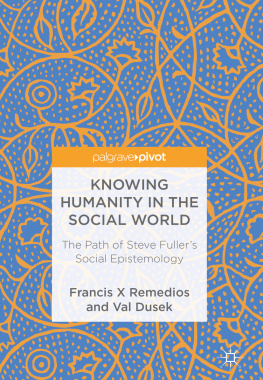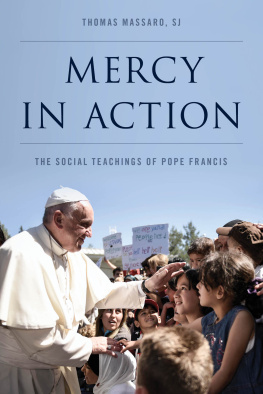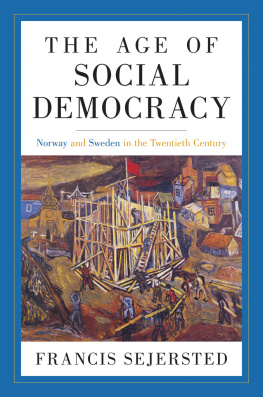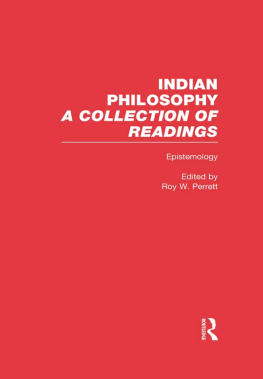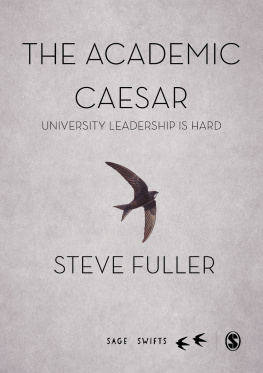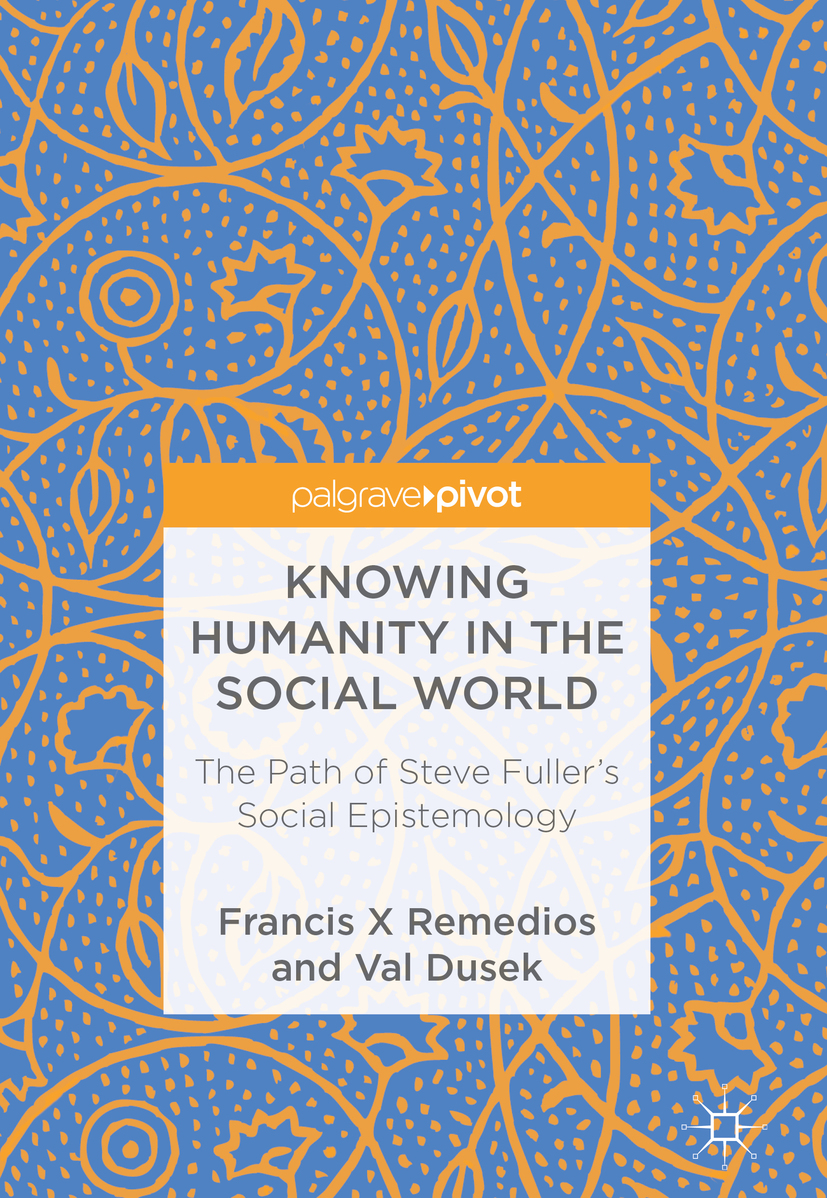Francis X Remedios and Val Dusek
Knowing Humanity in the Social World The Path of Steve Fullers Social Epistemology
Francis X Remedios
Edmonton, Alberta, Canada
Val Dusek
University of New Hampshire, Durham, NH, USA
ISBN 978-1-137-37489-9 e-ISBN 978-1-137-37490-5
https://doi.org/10.1057/978-1-137-37490-5
Library of Congress Control Number: 2017963093
The author(s) has/have asserted their right(s) to be identified as the author(s) of this work in accordance with the Copyright, Designs and Patents Act 1988.
The Editor(s) (if applicable) and The Author(s) 2018
This work is subject to copyright. All rights are solely and exclusively licensed by the Publisher, whether the whole or part of the material is concerned, specifically the rights of translation, reprinting, reuse of illustrations, recitation, broadcasting, reproduction on microfilms or in any other physical way, and transmission or information storage and retrieval, electronic adaptation, computer software, or by similar or dissimilar methodology now known or hereafter developed.
The use of general descriptive names, registered names, trademarks, service marks, etc. in this publication does not imply, even in the absence of a specific statement, that such names are exempt from the relevant protective laws and regulations and therefore free for general use.
The publisher, the authors and the editors are safe to assume that the advice and information in this book are believed to be true and accurate at the date of publication. Neither the publisher nor the authors or the editors give a warranty, express or implied, with respect to the material contained herein or for any errors or omissions that may have been made. The publisher remains neutral with regard to jurisdictional claims in published maps and institutional affiliations.
Cover illustration: Pattern adapted from an Indian cotton print produced in the 19th century
Printed on acid-free paper
This Palgrave Macmillan imprint is published by Springer Nature
The registered company is Macmillan Publishers Ltd.
The registered company address is: The Campus, 4 Crinan Street, London, N1 9XW, United Kingdom
Foreword
Knowing Humanity in the Social World is an apt title for a book about my work, especially one focused on the period after my having founded social epistemology as an interdisciplinary field in the 1980s and 1990s. For nearly 20 years now, I have been in search of this being, the human, who is supposed to be the subject of significant epistemic activity. From the outset, I took seriously Michel Foucaults observation in The Order of Things that the human has always been an uncertain entity, straddling the animal and the divine. But whereas Foucault himself affected a pose of indifference to the future of humanity worthy of a Darwinisteasy come, easy go, from the standpoint of geological timeI have struggled with the problem of what is it about our humanity that is worthy of preservation and enhancement. In my most recent writings, I speak of the value added of being human, as machines are getting better at matching and excelling at our most highly valued traits. The word perseverance, now an archaism in English but resonant with such great mid-seventeenth-century thinkers as Hobbes and Milton, captures my sense of quest for the human in a world that in both postmodern theory and capitalist practice incentivizes the erasure of just such an entity from the ontological record.
The book concludes with an interview, which captures something of my spontaneous response to questions. However, the reader may not quite realize the import I place on improvisation as a mark of the humanespecially when seen against the backdrop of trying to distinguish humans from animals and machines. I have encouraged the recording of my many talks for quite some time, the bulk of which appear on my website. Indeed, I have accepted so many invitations to speak because of the opportunities they afford me to say things in a new context to a new audience, which in turn provides a crucible for forging new content. I rarely if ever speak from a prepared textthe text is what follows the talk for publication purposes. Of course, I have usually thought and written about the talks topic for quite some time. But what matters is what I say on the day, which functions as a live experiment, the outcome to which then helps me to decide how to go forward.
Ironically, academic hostility to this modus operandi is perhaps greatest in the so-called humanities, where one might have expected a level of human performance that rises above that of a lip-syncing paper reader or Powerpoint presenter. But alas, scholasticism reigns and people are praised for sounding exactly like their papers and only taking questions on exactly what those papers said. No wonder that artificial intelligence researchers think that their machines are close to overtaking humans! The standards of performance demanded of the people still regarded as societys premier knowledge producersacademicsare not as high as we have been led to believe. This observation throws into sharp relief the problem of specifying the value added of being human.
I owe a debt of gratitude to Remedios and Dusek for taking the trouble to piece together my various writings to arrive at something that is tractable to an academic reader expecting a more scholastic style of presentation. They correctly identify the general themes that cut across my work, but as the reader will quickly see, the academic uptake of my work is rarely done in terms of the trajectory of my own intellectual project. One recent article, briefly noted by Remedios and Dusek, which does a finealbeit, in the end quite criticaljob of offering an overall assessment of my direction of intellectual travel, is William Lynchs Social Epistemology Transformed. But generally speaking, my work tends to be contextualized in terms of already existing debates, where my interventions are often difficult to accommodate and hence easily misunderstood, if not outright dismissed. Remedios and Dusek identify those dialectical contexts well, often introducing figures whose positions are relevantly compared to my own, even if I have not introduced them myself (e.g. Jeremy Rifkins Algeny ), as well as adjudicate on what counts as fair and unfair criticisms of my positions. I also commend the books glossary. Although I dont use that much jargon by normal academic standards, I tend to be more allusive in terms of range of references and also sometimes deploy already existing terms and phrases somewhat differently from normal usage.
Im not ashamed to say that I have been opportunisticor kairotic, to use the proper rhetorical termin piggybacking on larger events to develop my own position. Im always on the lookout for vehicles for my ideas, and as a tenured professor for most of my career, Ive been willing to take risks that others have not had the freedom to do. These include deconstructing Thomas Kuhn, the most influential theorist of science of the second half of the twentieth century, supporting Intelligent Design theorys claim for space in the biology curriculum alongside the modern evolutionary synthesis, or contributing to the philosophical and political maturation of transhumanism, a position that even most postmodernist academics regard as science fictional. I have found all these episodes incredibly fruitful to my thinking, even as they puzzled many onlookers and increased the level of tension surrounding me in the academy.

